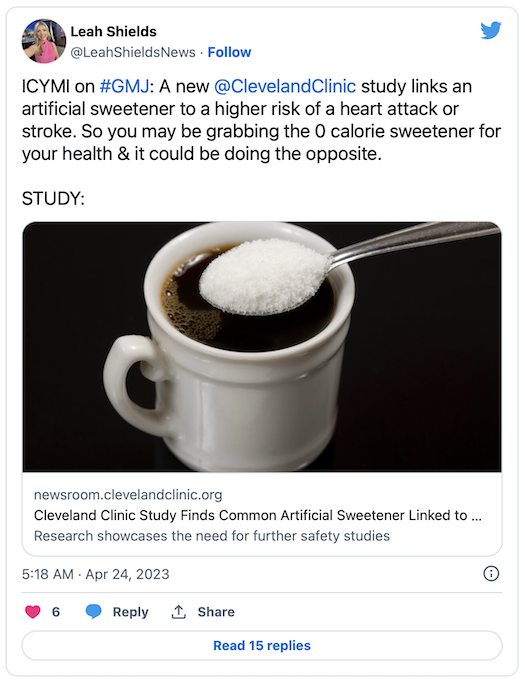 JACKSONVILLE, Fla. — All because its sugar-free does not mean it is good for you. A new Cleveland Clinic study found a link to a common artificial sweetener found in diet foods and an increased risk of heart attack and stroke.
JACKSONVILLE, Fla. — All because its sugar-free does not mean it is good for you. A new Cleveland Clinic study found a link to a common artificial sweetener found in diet foods and an increased risk of heart attack and stroke.
A little packet of faux sugar promising 0 calories is tempting for those looking to make some lifestyle changes, but it turns out replacing the real stuff can come with some unintended consequences.
Chief of Cardiology at Ascension St. Vincent’s Riverside Dr. Anthony Magnano says we need to take this study seriously.
Artificial sweeteners that you see at your grocery store often have this as the ingredient: erythritol. It is something that some foods naturally have, but this added sweetener is what a new study is worried about especially since it’s often targeted towards diabetics and people trying to lose weight.
The study published in Nature Medicine looked at more than 4,000 people in the U.S. and Europe and found that those with higher erythritol levels in their blood had a 2 times higher risk of major cardiac events like a heart attack or stroke or even death.
“This study with erythritol is really really interesting because it does sort of go beyond body weight,” Magnano said. “Because you can say I’ve cut my calories down tremendously because now I have erythritol containing foods. But now while your weight may be lower, your cardiac risk may be higher than you would recognize or expect during that given week.”
Dr. Magnano says more research needs to be done, but for now focus on cutting sugar and not simply replacing it with artificial sweeteners.
There are some artificial sweeteners without erythritol.
“It’s probably really really good to keep away from excessive added sugars, but as we do so I think the really important this is to retrain our palettes away from sweetness a little bit so that we get used to things with less sweetness,” Magano suggested.
“Because as we start to reach for these artificial sweeteners, there may be unintended consequences that we are actually still learning about.”
Why is there a link? The researchers found it enhanced coagulation of blood and led to higher levels of blood clots.
It’s important to note this study found a link and not causation. Magnano says more research would be needed to prove that this ingredient causes heart attack or strokes.
Written by Leah Shields for First Coast News ~ April 26, 2023

